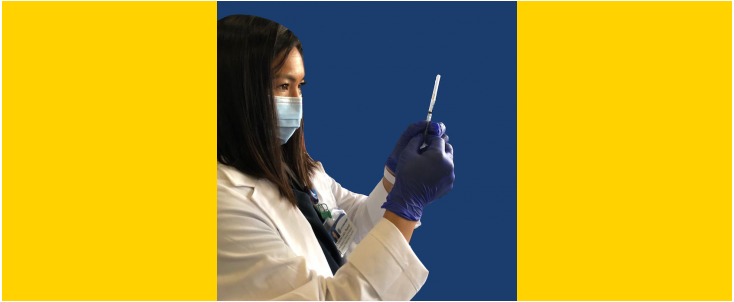
A pharmacist’s role extends far beyond dispensing medication. From administering COVID-19 vaccines, to providing direct patient care, to increasing medication access, to reducing health disparities, and advocating for medication safety– the clinical faculty at UCI’s School of Pharmacy and Pharmaceutical Sciences, engage in impactful, collaborative and interdisciplinary work that transforms healthcare and wellness in society.
Administering COVID-19 Vaccines
Pharmacists have become one of the most frequent providers of adult immunizations, which has positioned them to contribute to the COVID-19 vaccine effort. They have also been heavily involved in mass vaccination efforts with roles in every step of the process from logistics, to vaccine dose preparation and administration, to education.
“Pharmacists are more easily accessible than other types of healthcare providers, they are highly trusted, and they can provide vaccines at the neighborhood level. In this way, we may be able to ease some of the vaccination-related disparities and inequities,” said Keri Hurley-Kim, PharmD, MPH, APh, health sciences assistant clinical professor.
Hurley-Kim is currently involved with the LA County Department of Public Health’s COVID vaccine workgroup. She focuses on projects surrounding vaccine communication, access, and equity. Along with other faculty from the department of clinical pharmacy practice, Hurley-Kim has been working at the UCI Bren Center and other vaccination sites to prepare and administer COVID-19 vaccines.
Providing Direct Patient Care
The role of a pharmacist is expanding to meet the healthcare needs of patients and to ensure their medications are being used safely and effectively at every phase of their medical journey. Pharmacists collaborate with other health care professionals to ensure patients receive comprehensive and quality support.
Joyce Y. Lee, PharmD, APh, health sciences clinical professor, is an ambulatory care pharmacist whose specialty is to optimize chronic disease management through patient advocacy and individualized pharmacotherapy. In collaboration with the patient care team, her ultimate goal is “improve patient health and empower them to coexist with their conditions, confidently and with control.” Lee has started a CAREPILLS clinic at the Federally Qualified Health Center in Anaheim, providing direct care to patients with chronic diseases.
The role of pharmacists is evolving, and pharmacists have made significant contributions to the healthcare system as a whole.
“Health services research from robust randomized controlled studies has shown that the pharmacist-involved collaborative care approach, compared to the usual care, excels in producing better clinical, humanistic and economic outcomes,” said Lee.
Christine Cadiz, PharmD, MA, APh, health sciences assistant clinical professor has recently started a pharmacist-managed comprehensive medication management (CMM) service for patients with heart failure, including those who have received or are preparing for a mechanical circulatory support device. Cadiz works closely with the cardiologists at UC Irvine Health to provide pharmaceutical care.
Solving Complex Problems
Pharmacists conduct research to solve complex problems in society.
Alexandre Chan, PharmD, MPH, APh, and founding chair of clinical pharmacy practice, actively integrates himself into multidisciplinary care at the Chao Family Comprehensive Cancer Center, to conduct translational research through a collaborative approach with the health care team.
Chan’s research focuses on strategies to optimize the management of cancer patients and survivors as a whole, “my research evaluates how patients can be impacted by the toxicities of anticancer treatments. My goal is to utilize the research to help improve patients’ quality of life and recovery.”
For example, in a recent study, Chan found autonomic benefits of cryotherapy in chemotherapy-treated breast cancer patients. Explore this article, to learn more.
Increasing Medication Access, Reducing Disparities, and Making an Impact
Pharmacists provide CMM, while working to improve medication access and adherence.
Cheryl Wisseh, PharmD, MPH, health sciences assistant clinical professor, provides CMM services in her clinical practice, “my passion involves working to reduce medication related challenges in racial and ethnic minorities, while learning more about how the pharmacist’s role can reduce racial and ethnic health disparities.
In a recent study, Wisseh identified pharmacy deserts in Los Angeles County, which are communities where the nearest pharmacy is at least one mile away. According to Wisseh, “a pharmacy shortage likely equates to fewer clinical pharmacy services, such as health screenings, vaccines, and medication management.”
Pharmacists like Wisseh, and UCI’s clinical faculty, are utilizing their skills to make a positive impact in the world by initiating change and influencing public policy.
L.A. County public health officials are using her study to identify and support pharmacy desert communities with COVID vaccine administration.
To mitigate health disparities, Wisseh has been working with county-led programs in South Los Angeles to increase pharmacy access for patients living in pharmacy deserts.
Advocating for Medication Safety and Effectiveness
Pharmacists make a positive impact in society by advocating for patients in terms of medication safety and efficacy.
“As an antimicrobial stewardship pharmacist, my goal is to evaluate antimicrobials so that patients get the most appropriate therapy, dose, and duration,” said Lee Nguyen, PharmD, APh, health sciences associate clinical professor. Nguyen has developed the antimicrobial stewardship program at St. Jude Medical Center in Fullerton.
While volunteering at the UCI Bren Center vaccine clinic, the department of clinical pharmacy faculty work to ensure that the compounding of vaccines is accurate and appropriate.
Education at UCI and Beyond
In addition to educating students at UCI, the department of clinical pharmacy faculty members also educate communities with information about medications and vaccines.
For example, at a community information session, UCI clinical pharmacy faculty discussed the why, what, where and when of COVID-19 vaccines. Panelists discussed vaccine efficacy, safety, administration and distribution. To learn more visit this site, and click here to register for the upcoming information session.
Every day, the clinical faculty at UCI, and pharmacists around the world continue to enhance health care, solve complex problems, and directly support patients. The dispensation of medication is one part of the multifaceted, integral role that pharmacists hold in society.
By: Nedda Bozorgmehri / UCI
